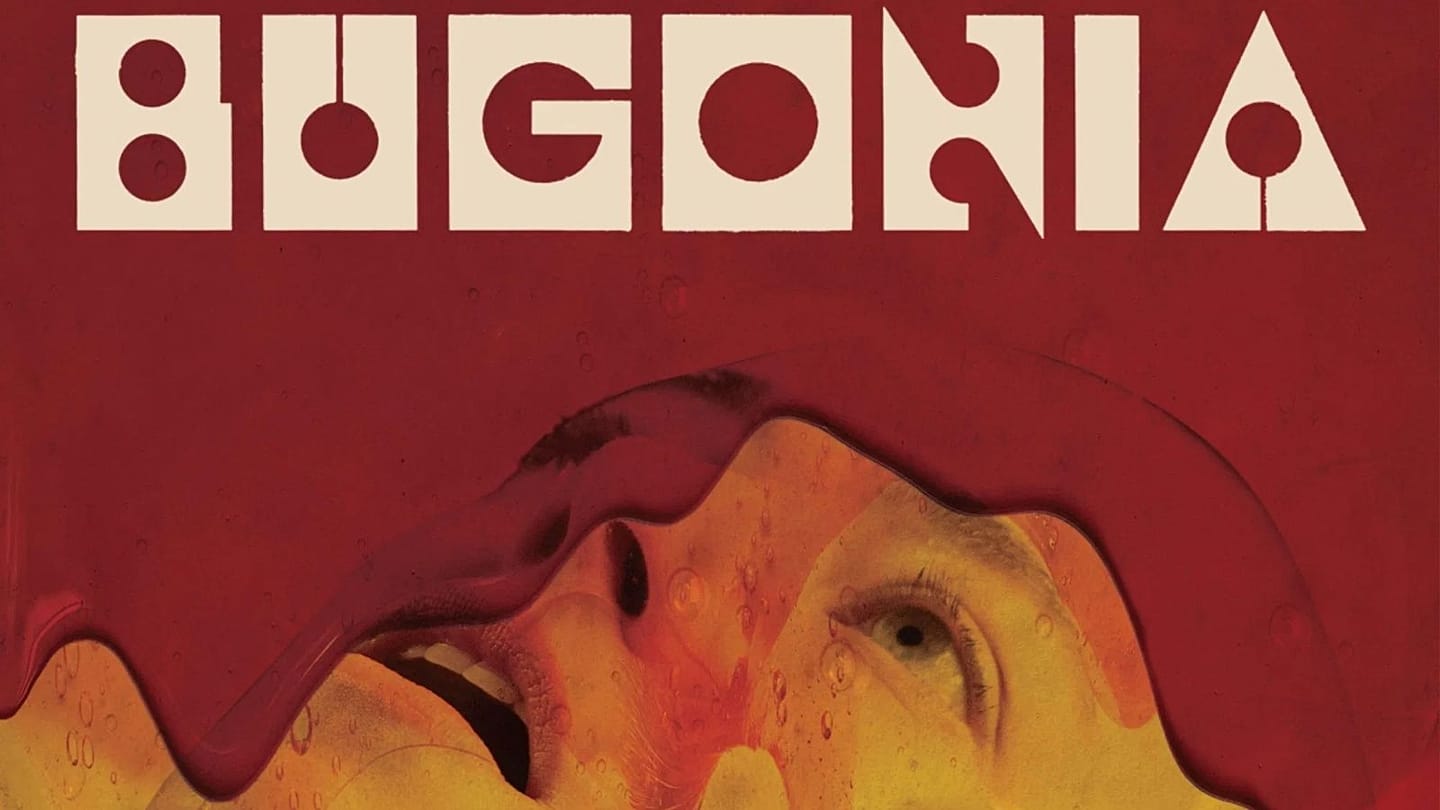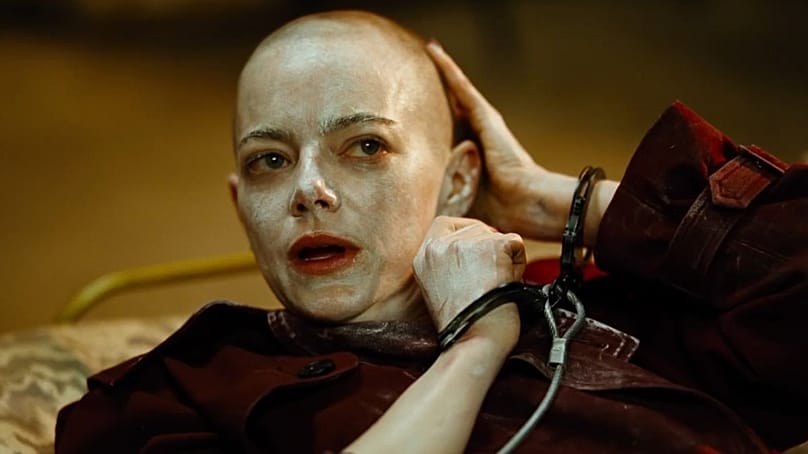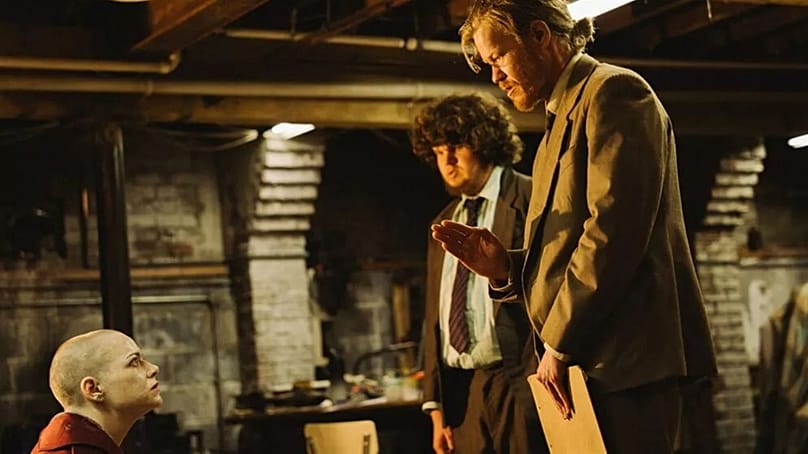
Corporate doublespeak. Disenfranchisement fuelled by expanding privilege gaps. Social media dug rabbit holes which promote conspiracy theories over critical thinking, leading to the breakdown of civil dialogue and the erosion of empathy.
Living in today’s increasingly chaotic world is not always fun, and when so many days feel like the bleak punchline to a joke Yórgos Lánthimos would tell, it’s hard not to think of the futility of human enterprise. Or surrender to the dispiriting prognosis that we, as parasites on an Earth we’re destroying, may deserve to reap the madness we’ve sowed.
How fitting then that the godfather of Greek Weird Wave’s latest offering is perhaps his timeliest yet, and definitely what 2025 ordered.
After putting his muse through a baroness fracas (The Favourite), a fantastical fable (Poor Things) and an underrated Twilight Zone triptych (Kinds Of Kindness), Lánthimos makes Emma Stone an object of cosmic suspicion in his fist remake – that of South Korean director Jang Joon-hwan’s 2003 comedy-horror Save The Green Planet!. She plays Michelle, the high-powered CEO of Auxolith Biosciences who gets kidnapped by intense beekeeper Teddy (Jesse Plemons) and his neurodivergent cousin Don (Aidan Delbis).
Once they’ve removed their Jennifer Aniston kidnapping masks, they shave her head and cake her in antihistamine cream. To counter the extra-terrestrial neurotransmitters.
You see, the two bumbling incels have doomscrolled their way into believing she’s an alien emissary from the Andromedan civilization and that she’s about to make contact with her species during a lunar eclipse in four days.
Step 1) Hold her in “the headquarters of the human resistance” – aka: their basement. Step 2) Secure a confession. Step 3) Negotiate a sit down on the mothership with their captive’s superiors. Step 4) Broker a deal to halt the planet’s decline.
Unhinged?
Whatever, sheeple.

Teaming up with former editor-in-chief of The Onion and Succession scribe Will Tracy, Lánthimos quickly mines this bonkers version of Misery for topical resonance. As straightforward as the abduction plot is, Bugonia wastes little time in revealing itself as a satire of the contemporary American psyche and a broader indictment of our modern age. Everything from girlboss capitalism to online radicalization and stymying echo chambers get a look-in here, and the director makes it all feel disturbingly current.
Thankfully, both Lánthimos and Tracy are not interested in simple binaries. Both Michelle and her jailers are two sides of the same coin. As despicable as Teddy is as a QAnon-style zealot, his underlying trauma (which at one point takes shape in a superbly absurd monochrome nod to Federico Fellini’s 8 ½) has alienated him to the point where his grief has morphed into fanaticism. As pathetic as Don is, he’s a product of a similar socially induced loneliness. And while Michelle is the embodiment of corporate greed, with her “Let’s kick impossible’s ass” trophies and passive-aggressive asides to her staff, she’s still fighting to stay alive in the face of dangerous delusion.
All of these nuances work because of Lánthimos’ ever-reliable mastery of tone, as he merges dark comedy and absurdist thrills to create an unnerving mood. He also knows to play with the right actors, as the cast is more than up to the challenge of the twisted assignment.
Stone is reliably brilliant as both the platitude-spewing executive and the victim trying to outsmart her way back to her pharma fort. Her electric back-and-forths with Plemons are both funny and terrifying, a sort of a power-dynamic cul-de-sac which can only end in violence. Her sparring partner, a lithe and pony-tailed Plemons, nails Teddy’s sweaty, entrenched psychosis and makes his performance not a million light years detached from the odious military character he played in Alex Garland’s Civil War. Still, his capacity to come off as deeply troubled lends him a pitiful air that subtly sneaks into the mix. As for Delbis, an autistic actor himself, he brings a level of pathos to Don that will unexpectedly break your heart.

Where Bugonia may fall short, for some, is on a visual level. Without tarnishing the stellar work by Lánthimos regular DP Robbie Ryan and his colour-saturated frames, thisis in large part a claustrophobic chamber piece, and therefore offers a smaller canvas to paint on. It’s that same reduced canvas that also leads to the sensation that while the absurdity of the premise will delight Yórgostans, Bugonia may feel more restrained in its execution compared to some of the director’s previous films. Until the final ten minutes, that is.
The punchline may be expected – especially for those who have already seen Save The Green Planet! – but it’s so grotesque and impressively mournful that you realise the director was building up to his weird resolution. Any passing reservations will be forgiven in a pop, especially when the final needle drop starts playing. Not only does it echo Stanley Kubrick’s darkly ironic inclusion of Vera Lynn’s ‘We’ll Meet Again’ at the end of Dr. Strangelove, but the song choice feeds the film’s title – the belief that bees can spontaneously arise from the decaying flesh of a sacrificed bull – and reveals its bleak poetry.
“When will they learn?” sings Marlene Dietrich in ‘Where Have All The Flowers Gone’.
The answer: Not any time soon. The privileged few within a broken society will prevail without considering the consequences of their so-called accomplishments. Divisions will widen through the proliferation of misinformation. Life will continue to feel like the unraveling mess we’ve allowed it to become.
But there may still be a way. Bugonia’s very title suggests so, as there’s renewal in death.
Maybe there’s hope. If humanity’s worst follies don’t tarnish their profound affections.
At the very least, if everything does collapse, Yórgos Lánthimos has ensured you’ll never listen to Green Day’s ‘Basket Case’ the same way or mispronounce the word ‘shibboleth’ again. Or look at a CEO without having second thoughts.
Bugonia is out in cinemas now.